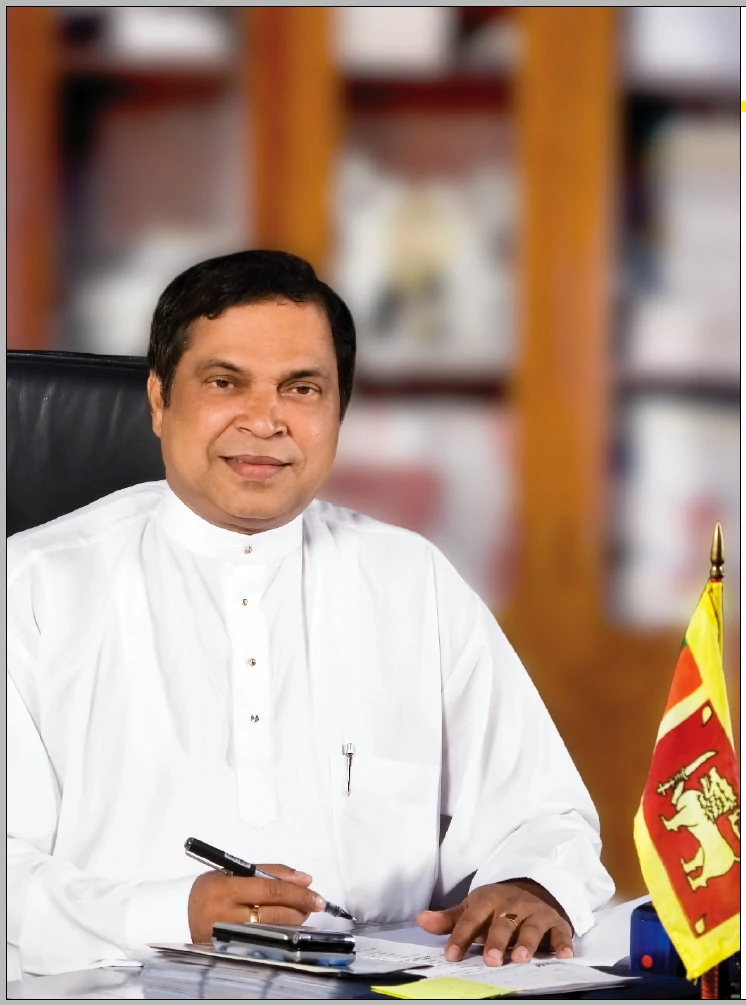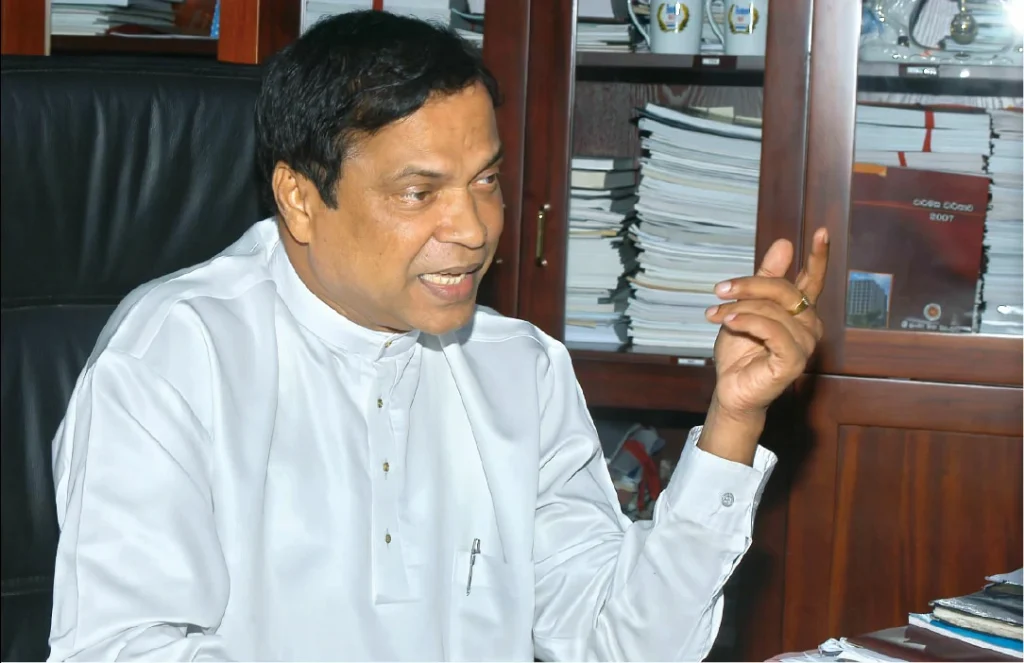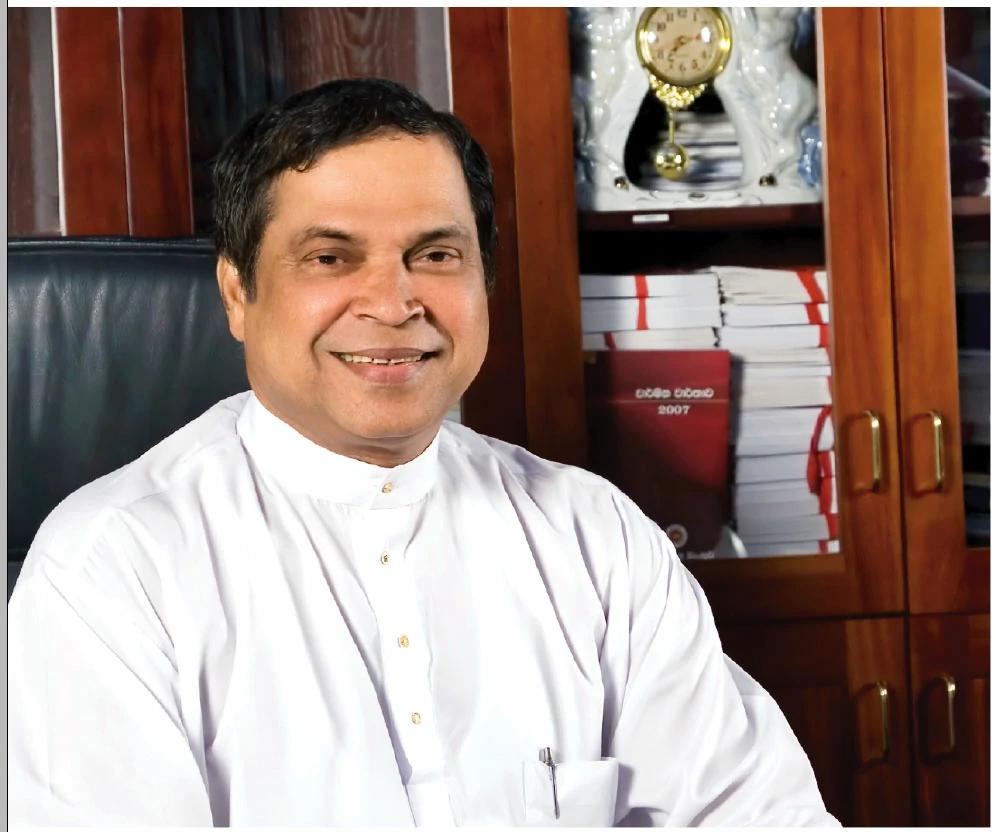
By Thilini Kahandawaarachchi
They work with the aim of creating a country where all citizens have access to skills development, vocational and technical education that will pave the way to productive employment and socio economic development within Sri Lanka. With the dawn of peace, there are massive development projects undertaken around the country and the Ministry of Vocational and Technical Training is keen to provide skilled labour to make these various initiatives a success. Minister of Vocational and Technical Training, Piyasena Gamage spoke to Business Today about the measures that have been taken by his Ministry to take vocational education to the youth of this country, management as part of vocational training, the measures taken to create an attitudinal change towards technical education and the Ministry’s contribution to develop Sri Lanka.
Could you tell us about the changes that were made to the Ministry of Vocational and Technical Training since you assumed duties?
After the election in 2007, the then President Chandrika Bandaranaike Kumaratunga included me in the Cabinet and the ministry that I received was the Ministry of Vocational and Technical Training, which deals with skills development, vocational training and technical education.
At that time, there were thirteen different training institutes with about 41,000 students spread all over the country and we brought all of those institutions together to create this Ministry. Additionally, some of the technical colleges were closed down by that time. For example, the technical college in Anamaduwa was closed down and the technical college in Balapitiya was about to be closed down. In fact, the situation at the Balapitiya Technical College was such that it had more staff than students. Therefore, when I assumed duties, we examined the situation in order to ensure that we do not close down any more technical colleges in the country. We carried out a reorganisation scheme to continue these technical colleges. Of course, there were some technical colleges that could not be saved and had to be closed down. We improved some by utilising the funds, which were saved from those institutes that had to be closed down. Further, instead of opening more new colleges, we restructured the existing ones.
As a result of all these measures, in the year 2007 alone, the number of students in these various institutions could be increased from 41,000 to 48,000. We even created new courses and syllabi for technical colleges, in order to increase the number of intakes.
Vocational education has been largely considered as a last resort for many students. Has your Minis-try taken any steps to change this perception?
When it comes to technical and vocational training, there are various views in our society and those need be changed. We have to give technical education the due recognition and acceptance in society. It is of utmost importance that we create an acceptance for technical education between people as well as children.
Even in today’s society ‘technical education’ or ‘vocational training’ is generally perceived as teaching carpentry or masonry. Therefore, it is necessary to create an attitudinal change. Some people look down upon it, or have an attitude that it is not such a big achievement to undergo technical training. Those are some of the various attitudes towards technical training and we are working to change that attitude in society.
In order to bring in that attitudinal change in our society, we have to change the attitudes of the people. One method in which we have attempted to do that is, we have created courses that are of timely importance to the country and started programmes that have a high demand. With certain programmes, we have even changed their names and rebranded those so that the public perception would change.
What steps have you taken to spread awareness about technical and vocational training?
When we started off, many people did not have any idea about our service. So we created an awareness programme to educate people. We made extensive use of media in the recent past and in order to make that attitudinal change in the people towards technical and vocational education, we conducted radio and television programmes as well as vocational guidance programmes.
Another measure that we took was that we got young graduates involved in our programmes. We created an office by the name “skills development officers”, and recruited one skills development officer from every divisional secretariat. Now they are in charge of taking our message across and educating people about our services.
The importance of vocational training has not reached the parents in our country. Most parents would like to see their child become a professional and they educate their children with that aim. However, when the child fails to reach that goal, most parents are at a loss as to what course to follow next. However, with the kind of programmes that we offer in various institutions under our Ministry, we try to educate people on the importance of vocational training. There are many well-recognised institutions such as the German tech, Japanese tech and the technical unit in Katunayake that have hundreds of students queuing up to enrol. There is great demand for those students and they have many job opportunities. More often than not, even before they receive their completion certificates they are recruited by employers. That is the kind of demand for these students, but unfortunately, many people do not know about it. Through our awareness programmes we have made efforts to take this message to the people.
With The Kind Of Programmes That We Offer In Various Institutions Under Our Ministry, We Try To Educate People Of The Importance Of Vocational Training. There Are Many Well-Recognised Institutions Such As The German Tech, Japanese Tech And The Technical Unit In Katunayake That Have Hundreds Of Students Queuing Up To Enrol.
Was the Vo-Tech exhibition organised by your Ministry also a part of this awareness programme?
Yes, we conducted the Vo-Tech exhibition with the aim of educating school children while they are still in school. Similarly it is also important to educate teachers because it is the teacher who knows the student, sometimes they know the students even better than parents. They know where the child is heading and some children are born with certain skills. Therefore, Vo-Tech exhibition was conducted with the aim of creating awareness among parents, teachers and students.
Our aim was to change the attitudes of students and to prepare them for technical education. I believe that you cannot go wrong if you follow technical education. A student who follows technical training will definitely get a job be it in the government sector or the private sector. There are also many opportunities in the industrial sector and similarly they can be employed abroad or else they can always be self-employed.
You mentioned that thirteen institutions came together to form the Ministry of Vocational and Technical Training. There are many other institutions under your Ministry as well. Is there a mechanism to control them and maintain the standards?
Technical training is conducted by various government organisations, private organisations as well as voluntary organisations. However, earlier most of them were not properly organised.
For example, when a student sits for the Advanced Level examination, no matter where they study, students receive the same certificate from one body. That certificate is accepted anywhere and irre-spective of where the student has received his education, it is of the same standard. But, in technical training there was no such common standard and there was no true recognition given to the technical training certificate that students receive. Therefore, one of the very first things that we did was introducing the national vocational training certificate. This certificate is awarded to students at the completion of their training based on their level of proficiency. It is not only a national certificate, it is recognised internationally, particularly in countries such as Australia, Korea etc. This system is referred to as the National Vocational Qualification certification system. When this was introduced, not only the State sector but even the Private sector came forward expressing their desire to award the certificate.
We gave value to the knowledge of the students. We categorised the levels of knowledge, for example, a motor vehicle technician would have various levels of proficiency from level one to four. Level fuve and six are diploma levels and level seven is the higher diploma. Previously we did not have such a system where the levels of technical education was categorised. All technical institutes and vocational training institutes, even the NAITA had only certificate level education and training. But now we have gone beyond that and offer diploma and higher diploma programmes.
We also selected one technical college from each province and started nine colleges of technology. In those technical colleges we started courses that offer diplomas of the 5th and 6th level and also new courses of timely importance. We also brought in trainers from abroad and even sent some to be trained abroad in countries such as Japan, Korea etc and continue these programmes in these insti-tutions.
We even have a college in the North. In fact the institute in Jaffna was the first of its kind and it was started with Korean funding. We have finished the work in that college and soon it will be declared open. It was done at the cost of a large amount and it is a great resource for the North. It offers diplomas and higher diplomas. With a certificate from such an institution, there are many employment opportunities open for students in that area.
You mentioned that the private sector is also involved in vocational training. Could you elaborate?
Our Ministry is very much involved with the Private sector. We are pleased to mention that the Private sector has also indicated great interest, sometimes even more than the State sector. They have helped us immensely in preparing the curriculum, the syllabi and even the National Vocational Quali-fication (NVQ) certification. Many private institutions have shown interest and introduced many of these new programmes in their institutions. They also promote vocational education and I believe that this is what should happen in a country.
How do you see the significance of technical or vocational education considering that a very small percentage of students enter the local universities?
In our country it is only about 2% that have the opportunity to enter university and the truth is even some of those who enter university and obtain a degree sometimes fail to secure a job. This is particularly so for students of the arts and sciences. It is true that our education system should also go through major changes, but we have to understand that the prevailing education system cannot be changed overnight.
An interesting aspect to note is that in some of our technical colleges we have students who already have a degree when they join the training colleges. For those students who already have a degree, our training is a sure way of obtaining a job. Of course, I am not demeaning the traditional degrees, I respect them and I am also a degree holder, but looking at today’s context, I believe that it is technical education that is more relevant.
One Of The Very First Things That We Did Was Introducing The National Vocational Training Certificate. This Certificate Is Awarded To Students At The Completion Of Their Training Based On Their Level Of Proficiency. It Is Not Only A National Certificate, It Is Recognised Internationally. This System Is Referred To As The National Vocational Qualification Certification System. When This Was Introduced Not Only In The State Sector But Even The Private Sector Came Forward Expressing Their Desire To Award The Certificate.
In addition to technical and vocational education, there is great importance placed on English and In-formation Technology. How are these aspects handled at vocational training institutes?
We teach English in technical training institutes as it is of great importance. We are very concerned about providing English education particularly for the higher levels. In fact, in the higher levels, the courses are conducted in English medium. In addition, we also teach Information Technology and some of the courses that are in great demand in these institutions are on Information Technology.
What measures have to be taken if a private institute is interested in working with your Ministry?
They can present their proposal and if they are within the stipulated criteria, then these courses can be conducted in their institutions. Vocational Training Authority is the widest spread organisation under our Ministry. There are about 280 institutes. There are 38 technical colleges and about 40 institutions under the National Apprentice and Industrial Training Authority (NAITA). In addition there is also the National Institute of Business Management (NIBM), which is a very well recognised organisation offering programmes in all disciplines in management. These programmes offer management training, education and consultancy services for the public and private sector institutions, school-leavers and mid career professionals. They also provide training in the field of IT. We conduct a degree programme at NIBM in collaboration with the University College Dublin and NIBM has the ability to offer the same degree that is offered in Dublin University, here in Sri Lanka. Lecturers from Dublin Univer-sity come to Sri Lanka to teach Information Technology. About 125 students follow this programme every year.
You mentioned about a number of changes that you made to your Ministry. What were the challenges that you had to face in implementing them?
When I was trying to bring in the legislation relating to the creation of degree conferring institutions I had to face many hardships. University students and professors were against it. Many were against the idea of establishing a university for technical education and claimed that we were degrading the degree. But I reasoned with them and presented my views in parliament and ultimately we were able to receive a unanimous vote in parliament. The technical university is not part of the traditional universities that we have in Sri Lanka. It is a different institution under our Ministry and was established under a separate enactment and it is governed by that separate legislation. It is a vocational training university and was declared open by President Mahinda Rajapaksa in March 2009. We have already started two faculties in Ratmalana.
What do you consider as the main achievements of your Ministry in the recent past?
As I mentioned, we have made arrangements to give a certificate recognising the level of training. I believe that it is the biggest and the main achievement that we had. Now they have the National Vocational Qualification (NVQ) certificate. Now our Ministry is able to issue a certificate that is recognised not only nationally but also internationally. Since there are different levels even an interviewer would know the level of knowledge that a person has. That is a major achievement that we have had. Another achievement is that we have been able to open technical colleges and vocational training institutes. Since I assumed duties I started two technical colleges in Anamaduwa and Akkaraipattu.
What are your plans for the future?
Our aim is to increase the number of students in these various technical colleges to up to 100,000. We also want to introduce more new programmes such as courses in nursing and hotel industry, which are of timely importance.
Looking back at the various improvements that you have done in this Ministry, what are your thoughts?
I have to say that over the years, vocational training and technical education have become my pet subjects. When I initially assumed duties I was not very interested as it was a complete break from my field. But today, it has become my most favourite area in the Cabinet, I can do something for the country and I get the opportunity to do something for the future generations of this country. I am able to do a service that cannot be erased from the history of Sri Lanka. Therefore, I can say that we have brought this Ministry to this position and I am very content that I have been able to do some service to our country.
Furthermore, Sri Lanka is a developing country and we need a skilled workforce to develop this country. Therefore, in order to create an organised workforce we have to give them training. At the same time, we have to provide employment opportunities and involve people in the development process of the country. Technical training is the best manner to do both and I am glad to say that we have been very successful in doing this in the past few years.
Any final thoughts?
President Mahinda Rajapaksa is trying to build a new Sri Lanka and His Excellency is doing a lot to improve the villages and bring development to the country through villages. In order to carry out these massive development projects we need skilled labour and in order to develop our country according to the Mahinda Chintana what our Ministry should do is to provide the skilled labour required for these projects. We are doing our best to contribute to that.








